The Stack
interface definition
- Important facts:
- The stack
only
defines
a
behavior on
the access of
the data
stored in a stack:
- pop( )
must return
the earliest item that
was pushed
|
- The stack does
not specify
how the
data must be
stored
- There are different ways
to implement
the same behavior !!!
|
- To
accommodate
different
stack implementations,
we can define
a Stack
interface
- Then
any class that
implements
the behavior (= methods)
in the Stack interface
can be used as
a Stack "object":
Stack a = new ClassThatImplementsStack() ;
|
|
A sample Stack interface
definition
- Sample
Stack interface
definition:
interface MyStackInterface<E>
{
boolean isEmpty(); // returns true is stack is empty
boolean isFull(); // returns true is stack is full
void push(E e); // Pushes elem e on the stack
E pop(); // Remove the elem at the top
// of the stack and return it
E peek(); // Return the elem at the top
// without removing it
}
|
|
A basic implementation
of the Stack interface
- The basic implementation
of a Stack is
using:
Schematically:
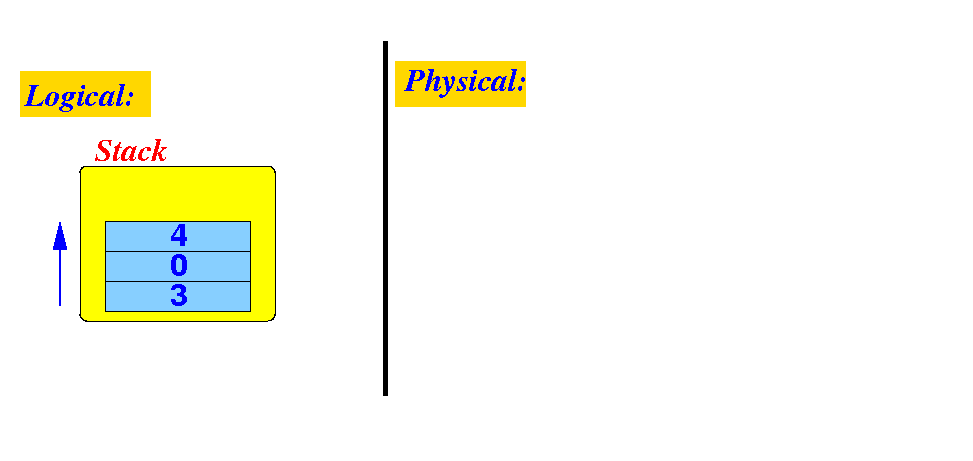
|
A basic implementation
of the Stack interface
- The basic implementation
of a Stack is
using:
- A fixed size
array to
store the
data items
-
|
Schematically:
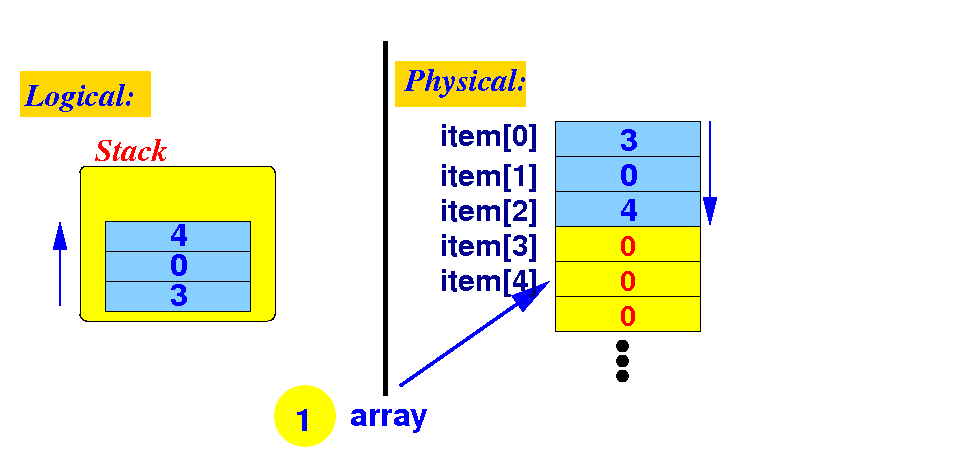
|
A basic implementation
of the Stack interface
- The basic implementation
of a Stack is
using:
- A fixed size
array to
store the
data items
- A
stackTop index variable
to record the
first open position
in
the array
|
Schematically:
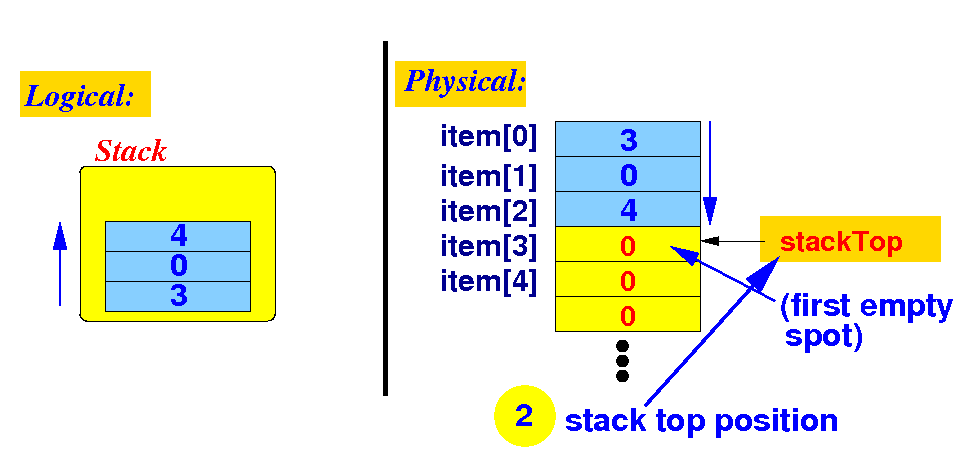
|
A basic implementation
of the Stack interface
- The initial state of
the stack when it
is instantiated (= created):
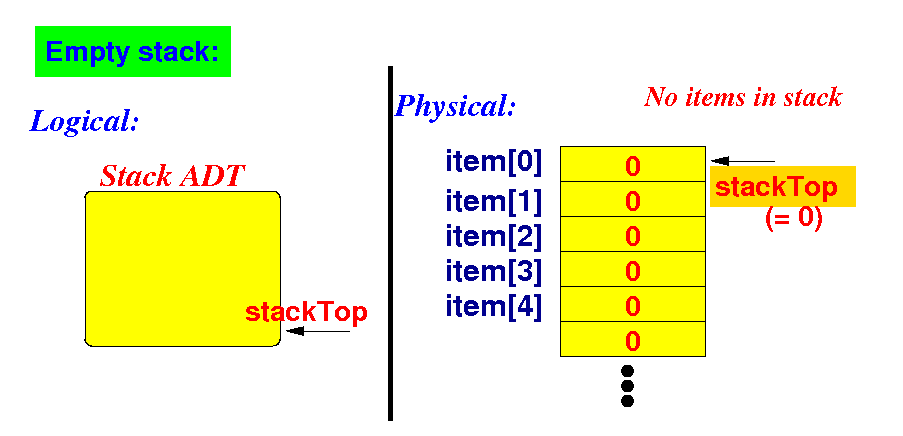
- Comment:
- I
choose to
initialize
stackTop = 0
to indicate and
empty stack
- An
alternate choice
can be
to use
stackTop = −1
|
|
A basic implementation
of the Stack interface
variables and constructor

- The
instance variables
and
the
constructor of an
Integer stack:
public class IntegerStack implements Stack<Integer>
{
private Integer[] item;
private int stackTop;
public IntegerStack(int N) // Create a stack of size N
{
item = new Integer[N];
stackTop = 0;
}
....
}
|
|
A basic implementation
of the Stack interface
isEmpty()

- The stack is
empty when
stackTop == 0:
public class IntegerStack implements Stack<Integer>
{
public boolean isEmpty( ) // Test if stack is empty
{
return stackTop == 0;
}
....
}
|
|
A basic implementation
of the Stack interface
push(x)
A basic implementation
of the Stack interface
push(x)
A basic implementation
of the Stack interface
push(x)
-
Basic implementaion of the
push( ) method:
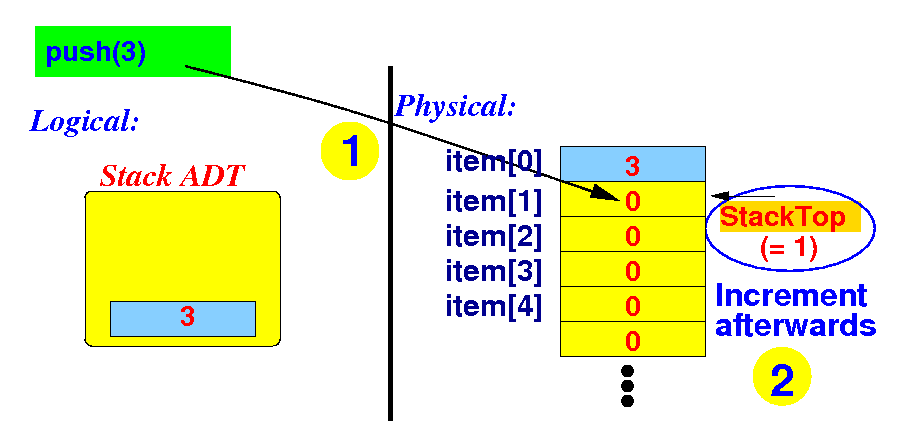
public void push(Integer e)
{
if ( isFull () )
{
System.out.println("Full");
return ;
}
item[ stackTop ] = e; // (1) store item
stackTop++; // (2) increment stackTop
}
|
|
A basic implementation
of the Stack interface
push(x)
-
Safer implementaion of the
push( ) method:

public void push(Integer e)
{
if ( isFull () ) // Implement this next
{
System.out.println("Full");
return ; // Or: throw an exception
}
item[ stackTop ] = e; // (1) store item
stackTop++; // (2) increment stackTop
}
|
|
A basic implementation
of the Stack interface
isFull()
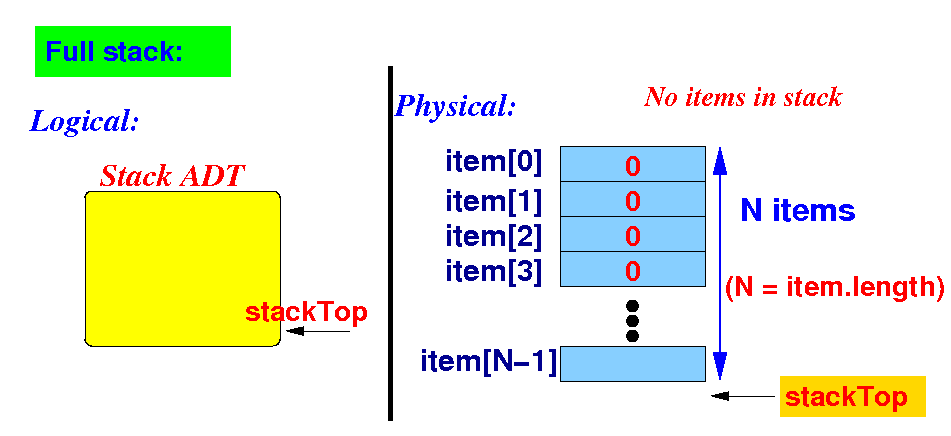
- The stack is
full when
stackTop == item.lenght:
public class IntegerStack implements Stack<Integer>
{
public boolean isFull( ) // Test if stack is empty
{
return stackTop == item.length;
}
....
}
|
|
A basic implementation
of the Stack interface
pop()
A basic implementation
of the Stack interface
pop()
-
Basic implementaion of the
pop( ) method:
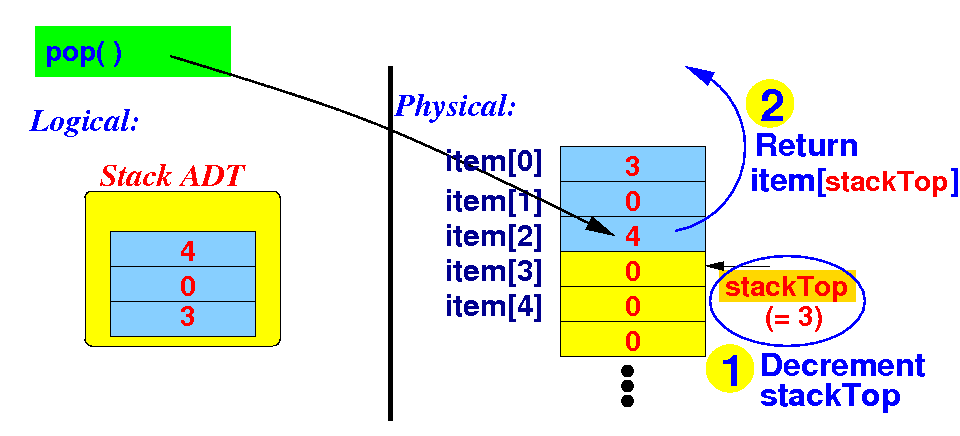
public Integer pop( )
{
if ( isEmpty () )
{
System.out.println("Full");
return ;
}
stackTop--; // (1) decrement stackTop
return item[ stackTop ]; // (2) return item
}
|
|
A basic implementation
of the Stack interface
pop()
-
Safer
implementaion of the
pop( ) method:

public Integer pop( )
{
if ( isEmpty () )
{
System.out.println("Empty");
return null; // Or: throw an exception
}
stackTop--; // (1) decrement stackTop
return item[ stackTop ]; // (2) return item
}
|
|
Demo program
- Demo program showing the
functionality of
the stack:
public class Demo
{
public static void main(String[] args)
{
IntegerStack s = new IntegerStack(5);
s.pop(); // Pops an empty stack !
s.push(1);
s.push(2);
s.push(3);
System.out.println( s );
System.out.println( s.pop() );
System.out.println( s );
System.out.println( s.pop() );
System.out.println( s );
System.out.println( s.pop() );
System.out.println( s );
}
}
|
|
DEMO:
demo/09-stack/01-array/Demo.java +
IntegerStack.java +
MyStackInterface.java
❮
❯





